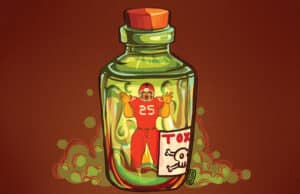As the weekend approached, my anticipation for the Premier League matches reached its peak, eagerly awaiting the chance to watch my favorite soccer team, Manchester United, take the field. However, the familiar disappointment ensued as they once again fell short, this time against their rivals, Manchester City. With each defeat, my Sundays grew increasingly bitter, trapped in a cycle of disappointment that seemed to repeat itself week after week.
The emotional toll of witnessing my favorite team lose, especially against their main rivals, led me to ponder a pressing question: what harm can relentless dedication to supporting a sports team cause? Driven by this curiosity, I embarked on a journey of research, seeking to unravel the potential drawbacks of my devoted fandom.

Remembering one of the biggest riots in Canadian history, the 2011 Vancouver Stanley Cup riot erupted in downtown Vancouver following the Boston Bruins’ victory over the Vancouver Canucks in game seven of the Stanley Cup Finals. Prompted by the loss, chaos ensued with widespread vandalism, looting, and arson resulting in significant property damage estimated at 4 million CAD. Police made nearly 100 arrests that night and pursued charges against over 300 individuals in the following years.
This event drew comparisons to the 1994 riot after the Canucks’ previous loss in the Stanley Cup Finals, prompting reflections on crowd control and law enforcement strategies. Despite efforts to maintain order, disturbances escalated throughout the evening, fueled by the emotions of disappointed fans and opportunistic troublemakers. Cleanup efforts were significant, with thousands of volunteers mobilizing to repair the damage and restore the city’s image. Media coverage both locally and internationally highlighted the contrast between the sportsmanship of the games and the chaos that unfolded in the aftermath. An iconic photograph of a couple kissing amidst the chaos became emblematic of the event, symbolizing resilience amidst adversity. Overall, the 2011 Vancouver Stanley Cup riot left a lasting impact on the city, prompting discussions on public safety, community response, and the role of social media in modern crises.
Reflecting on this event, we can observe that the implications of fandom can be quite severe and have dire consequences. Who is responsible for the perpetuation of this fanaticism? Did people just want an excuse to erupt in such a fashion to start looting or was the fandom solely to blame? These questions can leave you thinking and are ambiguous deliberately because we are not sure. To explore this further I dove into Shirley Wang’s article “Sports Complex: The Science Behind Fanatic Behavior” on the website for Association for Psychological Science to understand the underpinnings of an average sports lover. The perplexing behavior of sports fans was observed, shedding light on the psychological underpinnings of their loyalty and passion for their chosen teams. The researchers have found that sports fandom goes beyond mere entertainment, often becoming intertwined with individuals’ identities and sense of belonging. The fans start developing strong emotional attachments to their teams, viewing the victories and the losses of their teams as personal triumphs or failures. Social connectedness emerged as a key motivator for following sports, as fans find camaraderie and shared values among fellow supporters. In the case when teams consistently underperform, fans remain dedicated, drawing on coping strategies such as superstitions and biased perceptions to maintain their allegiance which shows the resilience of the fans.
Now, to comprehend the negatives of fanaticism, I studied Dr. Patrick Keelan’s “How to enjoy the psychological benefits while minimizing the psychological costs” on his website. It stated that supporting a team can lead to negative emotions and a blow to self-esteem when the team fails or the team does not make the playoffs. Also, the fan may experience negative feelings due to a team’s failure which can significantly impact emotional well-being, especially in the cases where one’s identity is tied to the team’s success. Finally, Dr. Keelan mentioned that over-investment in supporting a team without balance in other areas of life can exacerbate the negative effects of failures leaving individuals vulnerable to emotional distress.o minimize these cons Dr. Keelan advises engaging in other enjoyable activities apart from supporting the team and seeking support from a psychologist who specializes in cognitive behavioral therapy (CBT) which can be helpful in addressing issues related to sports fandom.
Sports stand as a remarkable testament to human achievement, showcasing the physical and mental capabilities of individuals working together to deliver awe-inspiring performances. However, in our contemporary societies, this spectacle has become a battleground of competition. We must remember at the end of each match and competition that losing your emotions over something you cannot control is a wasted effort that can be better diverted towards something positive.





